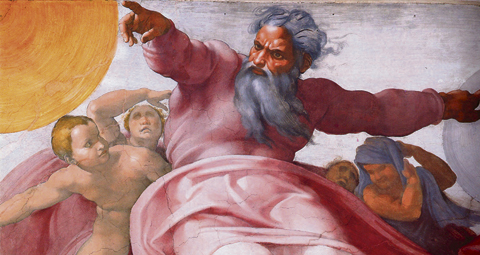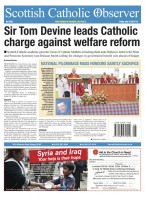January 18 | ![]() 0 COMMENTS
0 COMMENTS ![]() print
print

The struggle to come to terms with the ineffability of God
Fr Ronald Rolheiser
Nicholas Lash, in a deeply insightful essay on God and unbelief, suggests that the God that atheists reject is often simply an idol of their own imaginations: “We need do no more than notice that most of our contemporaries still find it ‘obvious’ that atheism is not only possible, but widespread and that, both intellectually and ethically, it has much to commend it.
This might be plausible if being an atheist were a matter of not believing that there exists ‘a person without a body’ who is ‘eternal, free, able to do anything, knows everything’ and is ‘the proper object of human worship and obedience, the creator and sustainer of the universe.’
If, however, by ‘God’ we mean the mystery, announced in Christ, breathing all things out of nothing into peace, then all things have to do with God in every move and fragment of their being, whether they notice this and suppose it to be so or not. Atheism, if it means deciding not to have anything to do with God, is thus self-contradictory and, if successful, self-destructive.
Lash’s insight is, I believe, very important, not first and foremost for our dialogue with atheists, but for our understanding of our own Faith. The first thing that Christianity defines dogmatically about God is that God is ineffable, that is, that it is impossible to conceptualise God and that all of our language about God is more inaccurate than accurate. That is not just an abstract dogma. Our failure to understand this, perhaps more than anything else, is the reason why we struggle with Faith and struggle to not fudge its demands. What is the issue here?
All of us, naturally, try to form some picture of God and try to imagine God’s existence. The problem when we try to do this is that we end up in one of two places, both not good.
On the one hand, we often end up with an image of God as some superman, a person like ourselves, except wonderfully superior to us in every way. We picture God as a superhero, divine, all knowing, and all-powerful, but still ultimately like us, capable of being imagined and pictured, someone whom we can circumscribe, put a face to, and count.
While this is natural and unavoidable, it leaves us, no matter how sincere we are, always, with an idol, a God created in our own image and likeness, and consequently a God who can easily and rightly be rejected by atheism.
On the other hand, sometimes when we try to form a picture of God and imagine God’s existence, something else happens: We come up dry and empty, unable to either picture God or imagine God’s existence. We then end up either in some form of atheism or afraid to examine our Faith because we have unconsciously internalised atheism’s belief that faith is naïve and cannot stand up to the hard questions.
When this happens to us, when we try to imagine God’s existence and come up empty, that failure is not one of faith but of our imagination. We are living not so much inside of atheism as inside of God’s ineffability, inside a ‘cloud of unknowing,’ a ‘dark night of the soul.’ We are not atheists. We just feel like we are. It is not that God does not exist or has disappeared. It is rather that God’s ineffability has put God outside of our imaginative capacities. Our minds are overmatched. God is still real, still there, but our finite imaginations are coming up empty trying to picture infinite reality, tantamount to what happens when we try to imagine the highest number to which it is possible to count. The infinite cannot be circumscribed by the imagination. It has no floor and it has no ceiling, no beginning and no end. The human imagination cannot deal with that.
God is infinite and, thus, by definition unimaginable and impossible to conceptualise. That is also true for God’s existence. It cannot be pictured. However the fact that we cannot imagine God is very different than saying that we cannot know God. God can be known, even if not imagined. How?
We all know many things that we cannot imagine, conceptualise, or articulate. Inside us there is something the mystics call ‘dark knowledge,’ namely, an inchoate, intuitive, gut-sense within which we know and understand beyond what we can picture and give words to. And this is not some exotic, paranormal talent that fortune-tellers claim to have. The opposite; it is our bedrock, that solid foundation that we touch in our most sincere and deepest moments, that place inside us where when we are at our best we ground our lives.
God is ineffable, unimaginable, and beyond conception and language. Our faith lets us bracket this for a while and lets us picture God as some idolised super-hero. But eventually that well runs dry and our finite minds are left to know the infinite only in darkness, without images, and our finite hearts are left to feel infinite love only inside a dark trust.
— Fr Ronald Rolheiser is a Catholic priest and member of the Missionary Oblates of Mary Immaculate. He is president of the Oblate School of Theology in San Antonio, Texas. Visit his website at www.ronrolheiser.com











